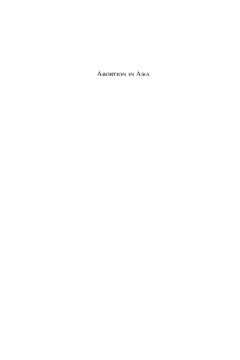
Additional Information
Book Details
Abstract
The issue of abortion forces a confrontation with the effects of poverty and economic inequalities, local moral worlds, and the cultural and social perceptions of the female body, gender, and reproduction. Based on extensive original field research, this provocative collection presents case studies from Thailand, Cambodia, Burma, Vietnam, Bangladesh, Indonesia, and India. It includes powerful insight into the conditions and hard choices faced by women and the circumstances surrounding unplanned pregnancies. It explores the connections among poverty, violence, barriers to access, and the politics and strategies involved in abortion law reform. The contributors analyze these issues within the broader conflicts surrounding women's status, gender roles, religion, nationalism and modernity, as well as the global politics of reproductive health.
Andrea Whittaker is Associate Professor in the School of Population Health, University of Queensland, Australia. Her previous publications include Intimate Knowledge: Women and their health in North-east Thailand (2000), Women’s Health in South-east Asia (edited, 2002) and Abortion, Sin, and the State in Thailand (2004). Her current research interests focus on infertility and reproductive tourism and medical travel in Thailand and the region.
“[This book] makes an empirically rich and important contribution to social scientific scholarship on induced abortion practices and will hopefully inspire further studies.” · Social Anthropology/Anthropologie sociale
“…although there is a wealth of commonalities, these papers present the context as crucial. The contributors make good use of women’s personal stories to invigorate the discussion of the many dilemmas. The women’s stories also demonstrate the extent to which local initiatives may be compromised by global influences, as exemplified by short sighted religious campaigns and the resulting donor/aid restrictions. The contributors’ focus on Asia actually makes this book more applicable, even germane, to women’s health care internationally.” · The Practicing Midwife
“This book is a comprehensive volume on abortion in South and Southeast Asia. Readers will benefit from this informative volume in gaining a bird’s eye view of the heated debate and local realities in these regions.” · Asian Anthropology
“The contributions make it a significantly important reference book for the areas of politics of reproduction, gender, and development, as well as gender, culture, and health. It would be particularly useful in medical anthropology in public health, anthropology and reproductive health, as well as gender and health courses.” · Medical Anthropology Quarterly
“Abortion in Asia offers rich insight into abortion policies and women’s reproductive-health experiences in Asia’s developing countries… Scholars interested in gender, reproductive health, abortion, and policies concerning these topics will find [this book] relevant, as will advocates, NGO workers, and policymakers. [It]provides useful insights for practitioners and advocates of safe and accessible abortion provision. Chapters on political processes aiming at legal reforms and policy implementation will be particularly useful for political scientists and advocates working toward the advancement of abortion rights in a variety of settings.” · Studies in Family Planning
“The book aims to spark a dialogue between academics and advocates, and between anthropology and public health.” · IIAS (International Institute for Asian Studies) Newsletter
